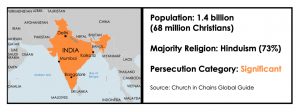
The Republic of India is the world’s largest democracy, comprising 28 states and eight Union Territories and is a land of diverse ethnicity, religion, language and geography. Over 430 languages are spoken, with Hindi and English the main official languages. The capital is New Delhi and the most populous city is Mumbai. While the vast majority of Indians are Hindu, there are enough Muslims (14% – about 172 million people) to make India the country with the third largest Muslim population in the world.
Despite its nuclear power, space industry and booming IT sector, India also has hundreds of millions of rural poor and urban slum-dwellers and suffers from inadequate infrastructure and widespread corruption.
Christians in India
Christianity is believed to have reached India in the first century and has an honoured legacy of charity, schools and hospitals. India’s constitution guarantees religious freedom and Christians enjoy freedom in much of the country, but in rural areas they face increasing persecution from Hindu extremists motivated by Hindutva (Hindu nationalist ideology), while the introduction of “anti-conversion laws” in several states has led to increased violence against Christians including church burning, property destruction and beatings. The laws are intended to prevent Hindus converting to other religions but extremists misuse them by attacking Christians on false accusations of forced or fraudulent conversion. Attackers generally act with impunity and are rarely arrested.
There has been an upsurge in persecution of non-Hindus since the 2014 landslide victory of Narendra Modi’s Hindu nationalist Bharatiya Janata Party (BJP). Prime Minister Modi and the BJP were returned to office in 2019, causing concern among religious minorities, and while the BJP failed to win a majority in the 2024 general election, the party is leading a coalition with Narendra Modi serving his third term as prime minister.
The United Christian Forum, a New Delhi-based human rights group, reported 834 anti-Christian incidents in 2024, an increase of 100 on the figure for 2023 and a huge increase in the ten years since 2014, when 127 incidents were recorded. The 2024 figure includes 149 physical attacks, 209 property damage incidents and 798 cases of intimidation, threats or harassment – many incidents involved a combination of these.
The Evangelical Fellowship of India’s Religious Liberty Commission reported 640 documented cases in 2024 (a figure it described as “only a part of the actual total”) – an increase on the 2023 total of 601 cases and more than four times the number of cases documented in 2014. The EFIRLC total for 2024 includes four murders, 255 incidents of threats and harassment, 129 arrests, 76 incidents of physical violence, 60 of gender-based violence, 46 of disruption of worship services and 41 of vandalism.
Each violent incident often results in widespread suffering (one church attack, for instance, affects multiple individuals) and incidents are underreported due to fear of reprisals and lack of confidence in the justice system.
Dalits
Hindus who convert to Christianity face persecution, especially those from low castes. The ancient Hindu caste system is still a major factor in Indian society, especially in rural communities where there is far less social mobility than in cities. Discrimination based on caste is constitutionally illegal but persists throughout much of India.
The caste system assigns each person a place in the social hierarchy from the privileged Brahmins at the top to the downtrodden Dalits at the bottom. There has been huge growth in Christianity amongst Dalits and tribal Indians and nearly 80% of Indian Christians are from Dalit or tribal backgrounds.
Only Hindu, Buddhist and Sikh Dalits qualify for the government’s affirmative action benefit system, which was designed to redress the socio-economic exclusion of the “Scheduled Castes” and makes them eligible for free education and reserved jobs in the government and seats in state legislature. Converts to Christianity or Islam are deemed to have left the caste system and are excluded from benefits.
In October 2022 the Indian government announced that it had formed a commission to review the issue of excluding Dalits who have converted to religions other than Buddhism and Sikhism. The commission is expected to submit a report in 2024.
The Kandhamal Massacre
The worst ever anti-Christian violence in India occurred in the Kandhamal district of Orissa state (now Odisha) in 2007 and 2008, when armed Hindu militants killed over 135 Christians, injured more than 18,000, burned hundreds of churches and thousands of homes and left over 55,000 Christians homeless. Many of the Christians were told to “convert or die“, sometimes at gunpoint, and militants bombed three refugee camps.
Violence against Christians in Kandhamal began in December 2007 but intensified in August 2008 following the assassination of a Hindu priest (local leader of the Vishwa Hindu Parishad [World Hindu Council] Swami Laxmanananda Saraswati) and four of his followers. Hindu extremists blamed Christians, despite Maoist insurgents claiming responsibility. In December 2008 seven Christians were arrested and falsely accused of the priest’s murder and in September 2013 they were convicted and sentenced to life in prison.
In November 2012 twelve people were sentenced to six years’ imprisonment each for involvement in the violence and in July 2014 a Maoist Naxalite leader who had claimed responsibility for the Swami’s murder in October 2008 was at last arrested; he was convicted in May 2019.
Between May and November 2019 the Supreme Court ordered that the seven Christians be released on bail, but they have yet to be acquitted by the Odisha High Court.
Church in Chains in Action
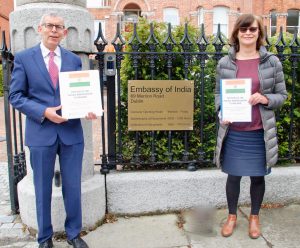 In July 2020, Pamela Coulter (Advocacy Officer) and David Turner (Director) were invited to present the Indian Ambassador to Ireland, Mr Sandeep Kumar with the petition signed by seventeen TDs and Senators in late 2018 expressing concern about the growth of attacks on Christians by Hindu militants.
In July 2020, Pamela Coulter (Advocacy Officer) and David Turner (Director) were invited to present the Indian Ambassador to Ireland, Mr Sandeep Kumar with the petition signed by seventeen TDs and Senators in late 2018 expressing concern about the growth of attacks on Christians by Hindu militants.
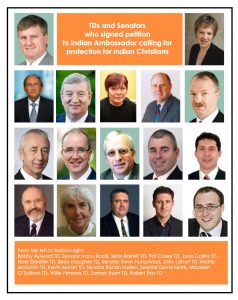 In January 2019 Church in Chains wrote to the Indian Ambassador to request a meeting to present a petition signed by 17 members of the Oireachtas calling for protection for Indian Christians and in March 2019 a Church in Chains delegation had a meeting at the Indian Embassy to discuss the issue.
In January 2019 Church in Chains wrote to the Indian Ambassador to request a meeting to present a petition signed by 17 members of the Oireachtas calling for protection for Indian Christians and in March 2019 a Church in Chains delegation had a meeting at the Indian Embassy to discuss the issue.
In September 2018, Shibu Thomas, founder of Church in Chains partner organisation Persecution Relief visited Ireland to speak at Church in Chains’ annual conference. During his visit, he also met with officials from the Department of Foreign Affairs.
In February 2018, Church in Chains published a report titled “OFFICIAL INDIA: ON THE SIDE OF THE MILITANTS” (see below) in response to the upsurge in attacks on Christians in India by Hindu militants. The report, which documents incidents of persecution and contains recommendations for action, was sent to the Indian Ambassador to Ireland, to Simon Coveney (Ireland’s Minister for Foreign Affairs) and to the members of the Oireachtas Joint Committee on Foreign Affairs and Trade, and Defence. The report formed the basis of a meeting with the Joint Committee in March 2018.
Church in Chains also supports the campaign of justice for Christian Dalits – the speaker at our 2014 conference, Dr Joseph D’Souza, is international president of the Dignity Freedom Network (formerly the Dalit Freedom Network), president of the All India Christian Council and former international vice-president of Operation Mobilisation.
Church in Chains report on attacks in 2017
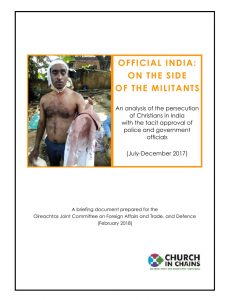 In February 2018, Church in Chains published a report titled “OFFICIAL INDIA: ON THE SIDE OF THE MILITANTS” in response to the upsurge in attacks on Christians in India by Hindu militants – attacks that have the tacit approval of local police and government officials. The report documents a representative sample of 57 serious incidents of persecution of Christians during the period July – December 2017, almost certainly a gross understatement of the actual number of incidents during the period.
In February 2018, Church in Chains published a report titled “OFFICIAL INDIA: ON THE SIDE OF THE MILITANTS” in response to the upsurge in attacks on Christians in India by Hindu militants – attacks that have the tacit approval of local police and government officials. The report documents a representative sample of 57 serious incidents of persecution of Christians during the period July – December 2017, almost certainly a gross understatement of the actual number of incidents during the period.
The organisation Persecution Relief, which supports Christians in India, recorded a total of 736 incidents of attacks against Indian Christians in 2017. While the Evangelical Fellowship of India (EFI) recorded 351 hate crimes against Christians during 2017, the authors of its annual report said that figure was not exhaustive, explaining: “Most cases go unreported either because the victim is terrified, or the police, especially in the northern states, just turn a blind eye and refuse to record the mandatory First Information Report.”
Like the Church in Chains report, the EFI report said that non-Hindu communities are being targeted “with impunity”. It listed four murders, 110 incidents of physical violence and arrest, 70 of “threats and harassment”, 64 occasions when worship was forcibly stopped, and 49 cases of Christians being arrested on false charges.
(Sources: All India Christian Council, Asia News, Barnabas, Christian Solidarity International, Compass Direct News, Evangelical Fellowship of India, Library of Congress – State Anti-conversion Laws in India, Morning Star News, Open Doors, Operation World, Persecution Relief, Release, United Christian Forum, Wikipedia, World Watch List, World Watch Monitor)
INDIA: Attackers who drove out Christians threaten to kill them if they return
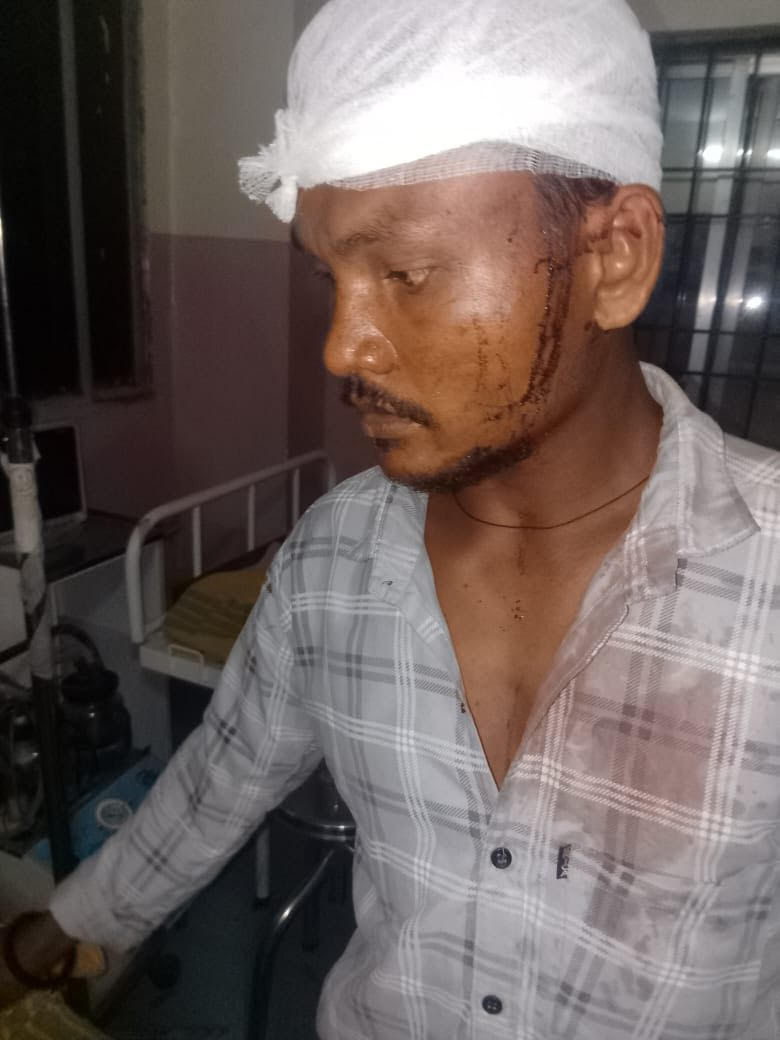
Attackers who drove Christians from their village in Chhattisgarh state in April have threatened to kill them if they return home
INDIA: Killer of Graham Staines given hero’s welcome on release
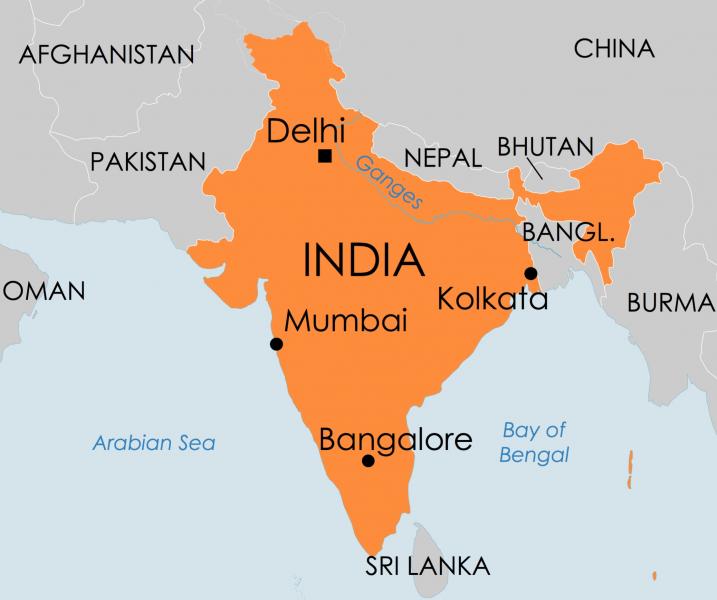
Mahendra Hembram was greeted by supporters who garlanded him and chanted the Hindu slogan, “Jai Shri Ram [Hail lord Rama]”
INDIA: Report documents 640 verified anti-Christian incidents in 2024
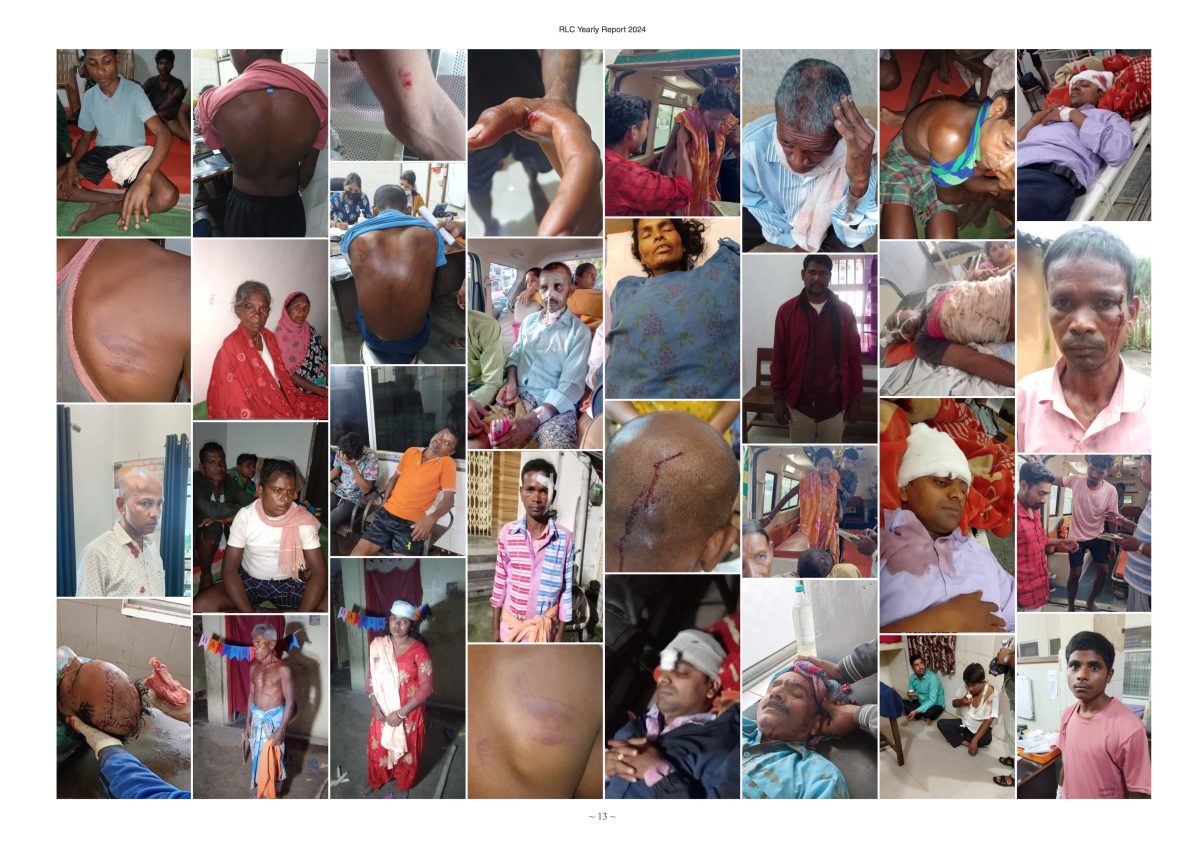
The actual number of attacks is likely much higher due to underreporting and fear of reprisals
INDIA: Nine Christians from two prayer groups arrested
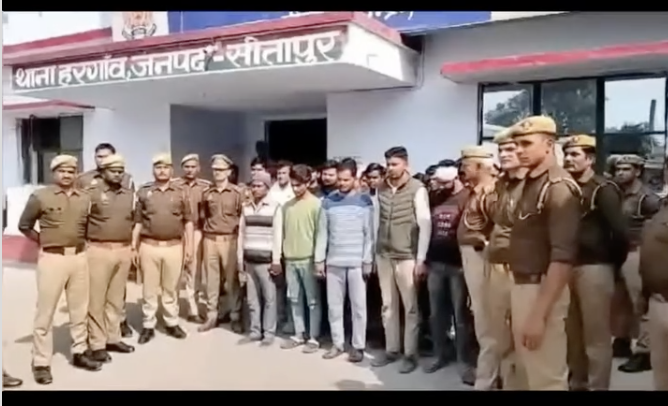
Uttar Pradesh police arrested nine Christians from two prayer gatherings on 23 February and charged them with forced conversion
INDIA: Pastor and wife released on bail
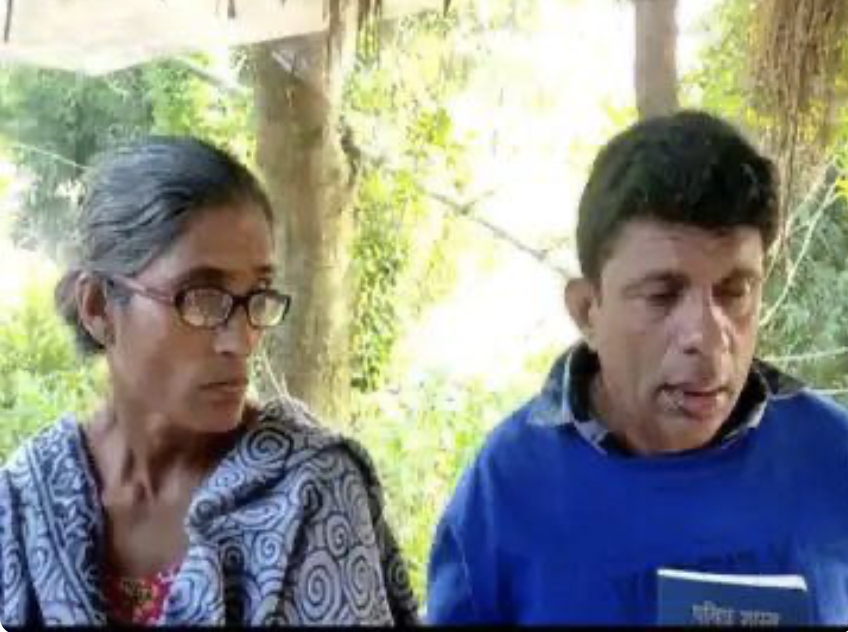
Pastor Jose and Sheeja Papachan had been sentenced to five years imprisonment each under Uttar Pradesh’s anti-conversion law
